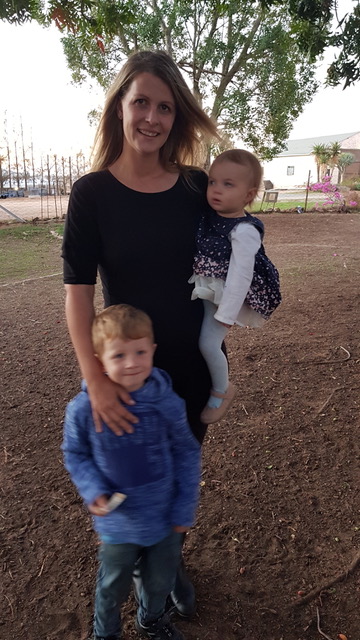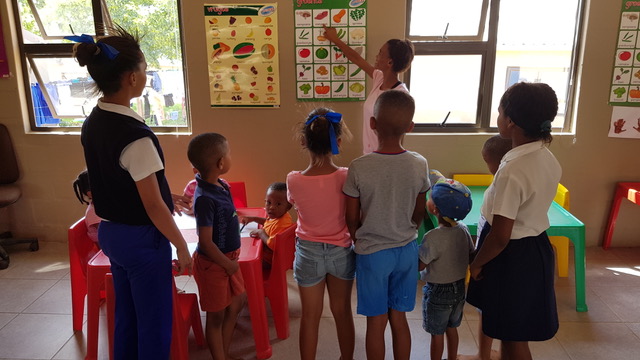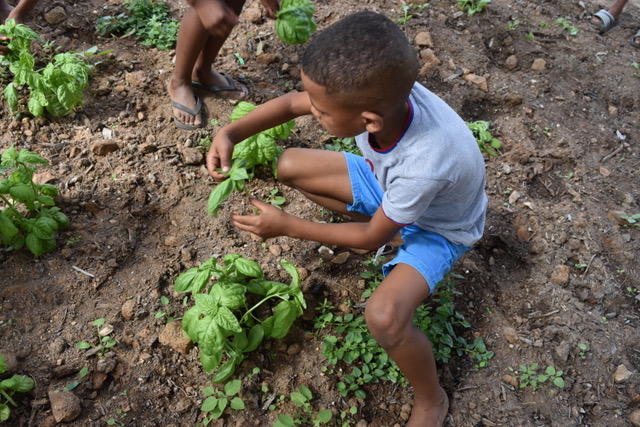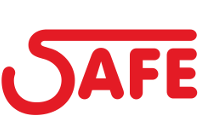What began as a simple home-based project to provide salad greens for a farmer’s family has turned – almost by accident – into a garden of inspiration for SAFE farm workers and their tiny tots.

“The project that inadvertently made farm families its focus, and where there is no financial incentive for the farm, seems to have instilled in our workers a sense of being really valued by the company. It shows them that SAFE cares for their well-being and the well-being of their children, which does a huge amount for staff morale and motivation.”
This is the observation of Katy La Grange, who is married to Zwartfontein farm manager, Frankie.
Katy began the salad garden to contribute fresh table greens for her family and two farm workers, Tannie Martha, who helps Katy with child-minding, and Mohammad, who works as a gardener at the Western Cape farmstead.
The greater vision in store for the salad garden took fruit in a casual conversation with SAFE CFO Quentin Scott and General Manager of Farming Operations, Dries van Rooyen when Katy mentioned her salad garden and how it had the potential to do more than provide just one family with greens.
“They immediately and enthusiastically supported the idea and this is where the journey of using ‘small market gardens’ to give the children at the creche, who bring a sometimes bland and often empty lunchbox to school, a nutritional boost began, ” says Katy.
Initially, the garden provided the creche with salads ingredients such as tomatoes, cucumbers, lettuces, spring onions, radishes beetroot and herbs – basically what Katy already had in the ground. “We now have cabbage, spinach, cauliflower, aubergine, squash, carrots, chili and peppers in the ground, so hopefully as the weather gets cooler we can provide soups and stews. Although at the moment, production is very much trial and error, we will see what works.”
But according to Katy, it was not simply a matter of planting and then looking to reap the harvest. “One of the challenges is getting the rotation right so that we have something to harvest week in and week out”.
“Pests are another issue. We have just had a devastating spider mite infestation in the garden that occurred overnight. Luckily, with the help of colleagues, Frankie was able to find a solution and we have it under control, but the damage was extensive. We also have issues with powdery mildew at the moment.” says Katy.
Although they are still in the early stages of the project, the benefits are clear to see.
Another positive spin-off from the veggie garden has been the involvement of the creche and school children who have helped with planting and harvesting produce. By getting them involved we have the opportunity to teach them about food and how easy it is to grow their own. Hopefully, this will help them in later life.

“They love eating produce straight from the ground,” says Katy. “During the last harvest the kids returned home with only half of what they had picked; the rest had been devoured on the bakkie ride home and the only evidence left of their crop was their tomato-stained mouths and huge smiles.”
“While the garden may not be producing the quantities of veggies we would like, it is more than providing the learning experiences we intended. I think that is perhaps the most important thing to have come from this garden – the message that growing your own produce is simple, delicious and healthy.”

Katy recently had the opportunity to show the garden to SAFE investors. “It was wonderful to show them what we had accomplished and the impact it was making. They had encouraging compliments about what we had achieved.”
What is really exciting is the ripple effect this garden seems to generate, with a number of the investors contacting Katy with news that they too were starting veggie gardens and oral health projects. “I am proud of the ripple effect that this project has generated, especially if it results in positive changes for both our farm community and other communities we have never met.”
Ultimately, the aim now is to roll these gardens out across SAFE farms, with the staff taking ownership of them, donating their own time to nurturing them. Katy says that she would encourage anyone thinking about starting a vegetable garden to do so.
According to Quentin, the benefits gained far outweigh the costs of getting one up and running. The nutritional benefits have been obvious from the outset, but it is the social and educational benefits this project brings that really makes it worthwhile. “These social gains are great for our farmworkers, their children and, of course, SAFE farms.”

